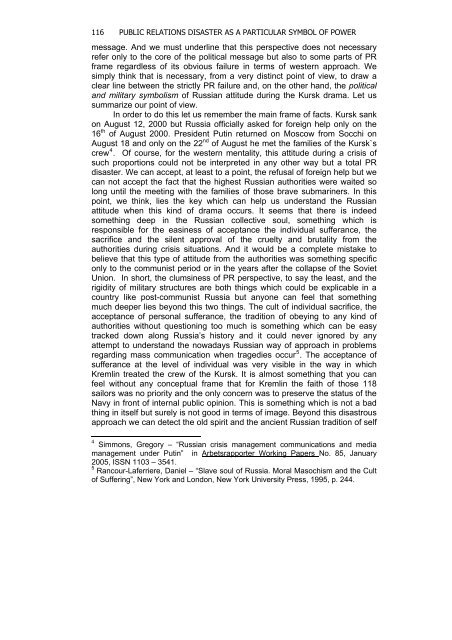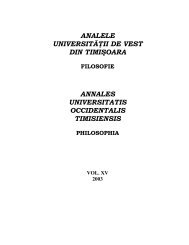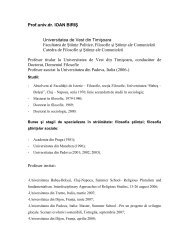VOL. IV (XXI) 2009 - Departamentul de Filosofie si Stiinte ale ...
VOL. IV (XXI) 2009 - Departamentul de Filosofie si Stiinte ale ...
VOL. IV (XXI) 2009 - Departamentul de Filosofie si Stiinte ale ...
You also want an ePaper? Increase the reach of your titles
YUMPU automatically turns print PDFs into web optimized ePapers that Google loves.
116 PUBLIC RELATIONS DISASTER AS A PARTICULAR SYMBOL OF POWER<br />
message. And we must un<strong>de</strong>rline that this perspective does not necessary<br />
refer only to the core of the political message but also to some parts of PR<br />
frame regardless of its obvious failure in terms of western approach. We<br />
<strong>si</strong>mply think that is necessary, from a very distinct point of view, to draw a<br />
clear line between the strictly PR failure and, on the other hand, the political<br />
and military symbolism of Rus<strong>si</strong>an attitu<strong>de</strong> during the Kursk drama. Let us<br />
summarize our point of view.<br />
In or<strong>de</strong>r to do this let us remember the main frame of facts. Kursk sank<br />
on August 12, 2000 but Rus<strong>si</strong>a officially asked for foreign help only on the<br />
16 th of August 2000. Pre<strong>si</strong><strong>de</strong>nt Putin returned on Moscow from Socchi on<br />
August 18 and only on the 22 nd of August he met the families of the Kursk`s<br />
crew 4 . Of course, for the western mentality, this attitu<strong>de</strong> during a cri<strong>si</strong>s of<br />
such proportions could not be interpreted in any other way but a total PR<br />
disaster. We can accept, at least to a point, the refusal of foreign help but we<br />
can not accept the fact that the highest Rus<strong>si</strong>an authorities were waited so<br />
long until the meeting with the families of those brave submariners. In this<br />
point, we think, lies the key which can help us un<strong>de</strong>rstand the Rus<strong>si</strong>an<br />
attitu<strong>de</strong> when this kind of drama occurs. It seems that there is in<strong>de</strong>ed<br />
something <strong>de</strong>ep in the Rus<strong>si</strong>an collective soul, something which is<br />
respon<strong>si</strong>ble for the ea<strong>si</strong>ness of acceptance the individual sufferance, the<br />
sacrifice and the <strong>si</strong>lent approval of the cruelty and brutality from the<br />
authorities during cri<strong>si</strong>s <strong>si</strong>tuations. And it would be a complete mistake to<br />
believe that this type of attitu<strong>de</strong> from the authorities was something specific<br />
only to the communist period or in the years after the collapse of the Soviet<br />
Union. In short, the clum<strong>si</strong>ness of PR perspective, to say the least, and the<br />
rigidity of military structures are both things which could be explicable in a<br />
country like post-communist Rus<strong>si</strong>a but anyone can feel that something<br />
much <strong>de</strong>eper lies beyond this two things. The cult of individual sacrifice, the<br />
acceptance of personal sufferance, the tradition of obeying to any kind of<br />
authorities without questioning too much is something which can be easy<br />
tracked down along Rus<strong>si</strong>a’s history and it could never ignored by any<br />
attempt to un<strong>de</strong>rstand the nowadays Rus<strong>si</strong>an way of approach in problems<br />
regarding mass communication when tragedies occur 5 . The acceptance of<br />
sufferance at the level of individual was very vi<strong>si</strong>ble in the way in which<br />
Kremlin treated the crew of the Kursk. It is almost something that you can<br />
feel without any conceptual frame that for Kremlin the faith of those 118<br />
sailors was no priority and the only concern was to preserve the status of the<br />
Navy in front of internal public opinion. This is something which is not a bad<br />
thing in itself but surely is not good in terms of image. Beyond this disastrous<br />
approach we can <strong>de</strong>tect the old spirit and the ancient Rus<strong>si</strong>an tradition of self<br />
4 Simmons, Gregory – “Rus<strong>si</strong>an cri<strong>si</strong>s management communications and media<br />
management un<strong>de</strong>r Putin” in Arbetsrapporter Working Papers No. 85, January<br />
2005, ISSN 1103 – 3541.<br />
5 Rancour-Laferriere, Daniel – “Slave soul of Rus<strong>si</strong>a. Moral Masochism and the Cult<br />
of Suffering”, New York and London, New York Univer<strong>si</strong>ty Press, 1995, p. 244.




